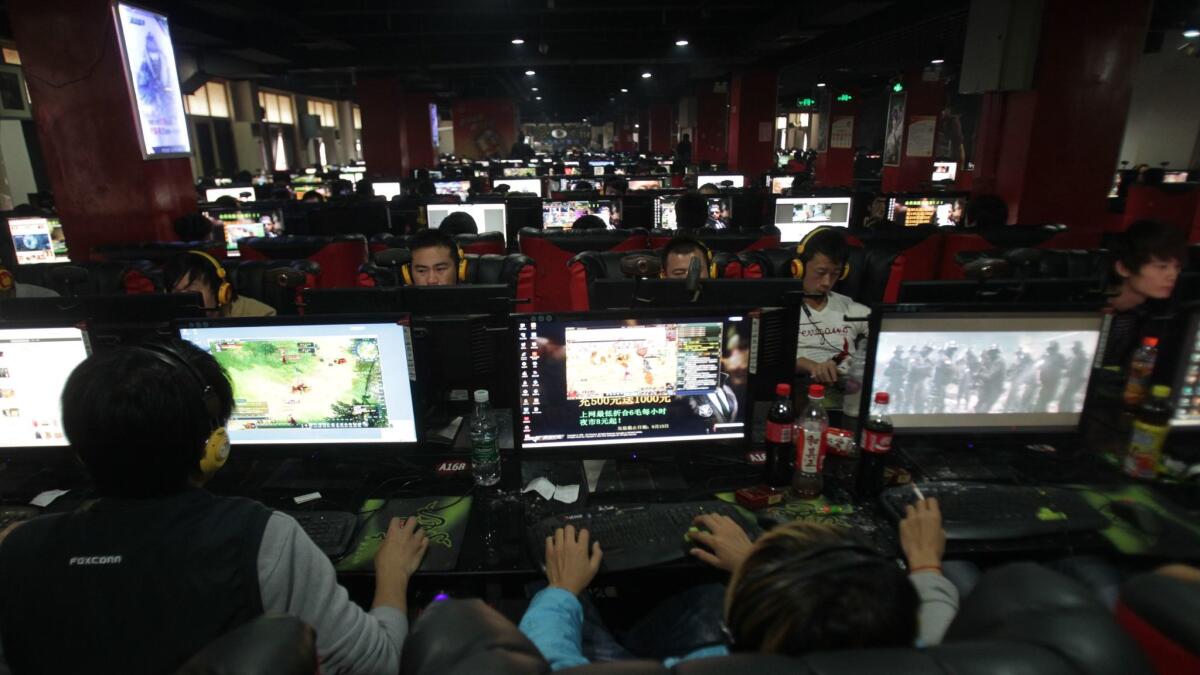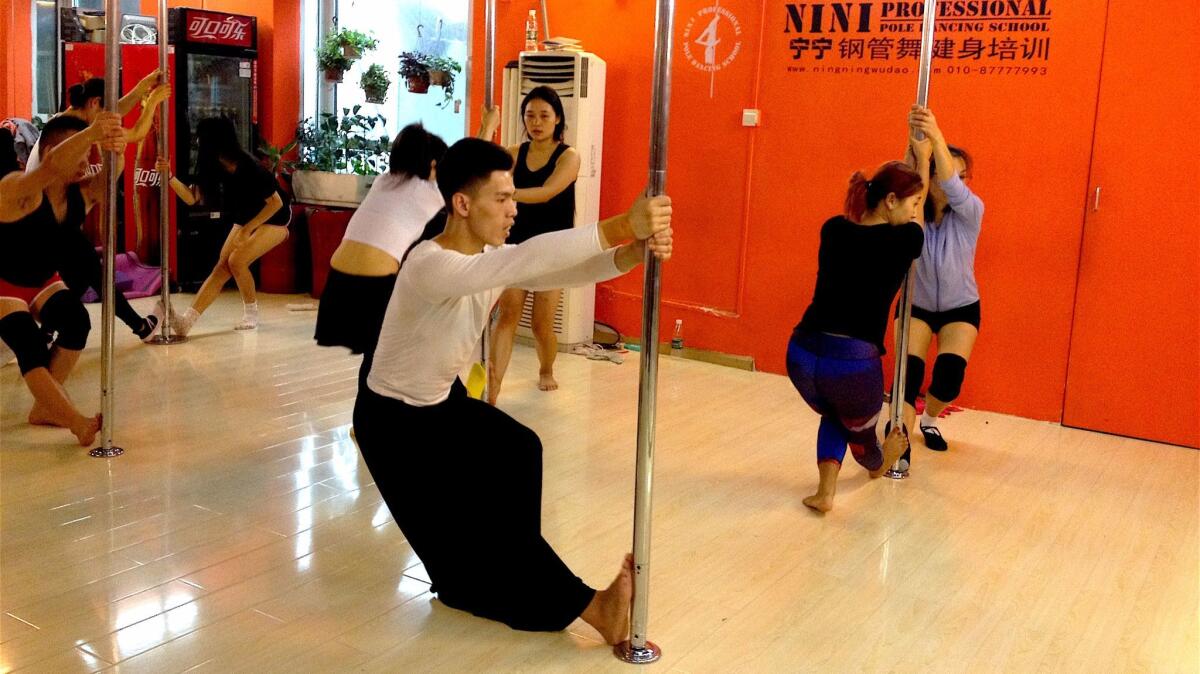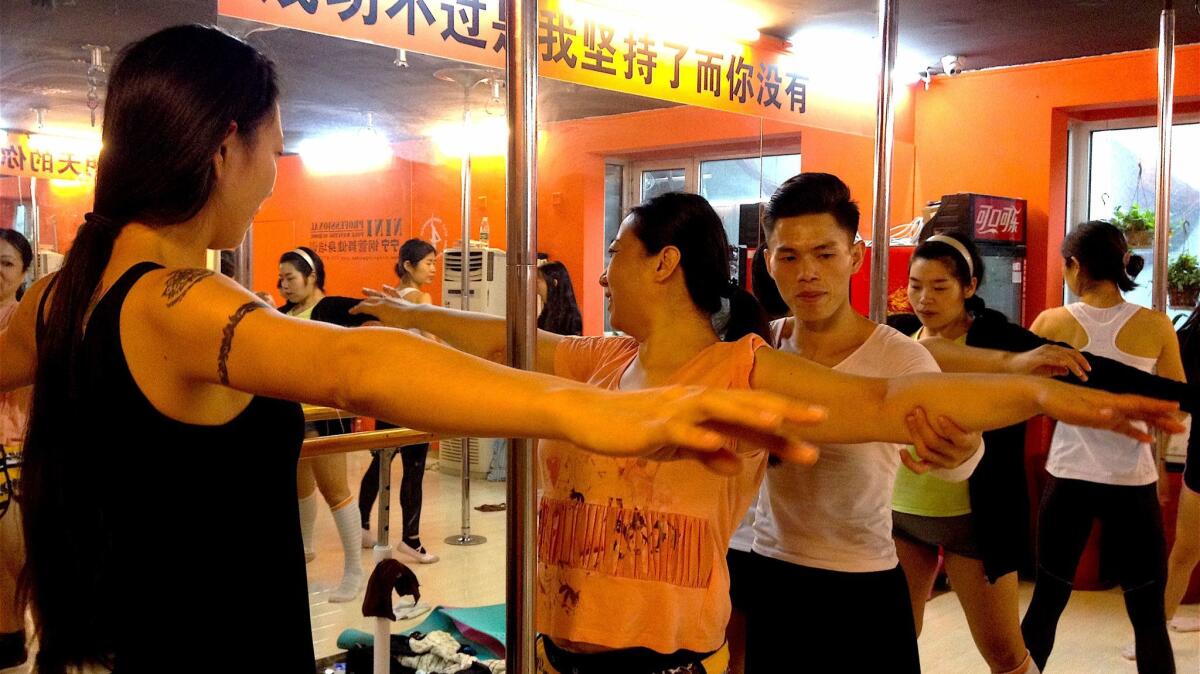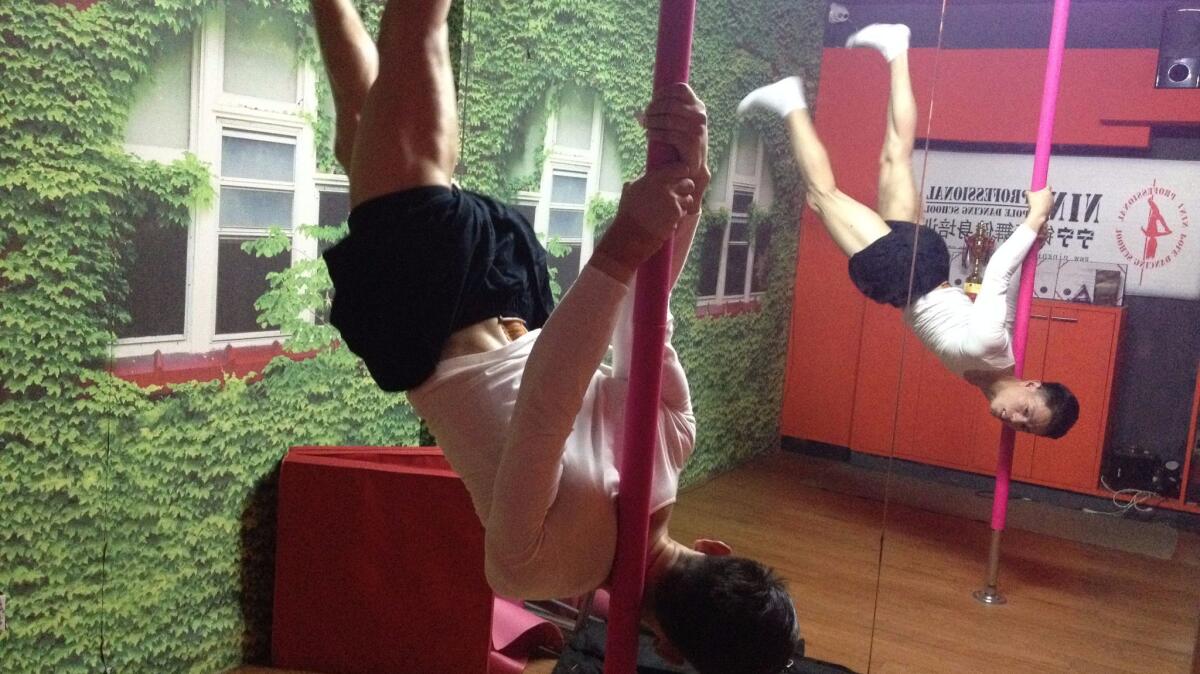The strange journey of a Chinese Internet addict — from cybercafes to pole dancing

Reporting from Beijing — After spending three days and three nights at an Internet cafe, Hou Xing reluctantly parted with his keyboard, stepped out into the blistering sun and collapsed.
His parents found him there a few hours later, barely conscious. At 14, Hou was thin as a rail, with a back curved from hours spent hunched over a computer screen. His days were consumed by “The World of Legend,” a massive, multiplayer, online role-playing game that took precedence over eating and sleeping.
Today, it is hard to imagine Hou, 23, without his athletic build — his arms capable of keeping his entire body suspended in the air, his back straight as a plank.
A chance encounter during his Internet-addled days in China’s Zhejiang province transformed Hou into a nationally-ranked pole dancer who has little time for games.
Far from the sensual performances of Las Vegas strip clubs, pole dancing in China is a combination of sport and dance, with influence from traditional Chinese acrobatics. Athleticism and elegance are judged in equal measure at regional competitions.
“Pole dancing is my entire life,” Hou said as he was warming up one Saturday at the Ning Ning Professional Pole Dancing Studio, one of five studios in Beijing where he works as an instructor. “It’s given me direction.”

In China, where an estimated 24 million young people are Internet addicts, Hou is an oddity for having cured himself. The country — the first to declare Internet addiction a clinical disorder in 2008 — has been a laboratory of controversial treatment methods.
“Web Junkie,” a PBS documentary that aired last summer, went inside a military-style Internet addiction treatment center in Beijing, where kids wore camouflage print uniforms and lived in barred dorms.
In 2009, a teenager was beaten to death at one such boot camp, while another was hospitalized with broken ribs and kidney damage. In September, Chinese media reported that a girl kept her mother tied to a chair for a week in retaliation for being sent to an abusive treatment center. Her mother died of starvation.
The Chinese government drafted a law in January that aims to curtail extreme rehab methods. The regulation, targeted at electroshock therapy and beatings, would forbid individuals and organizations from inflicting mental and physical harm on juveniles in seeking to cure their Internet addiction.
The legislation, still in draft form, would also require Internet cafes to limit the amount of time minors can play online games, prohibiting gaming between midnight and 8 a.m.
According to the Center for Net Addiction in New York, problematic Internet use — when a preoccupation with being online interferes with work and personal life — is common in China, where rigid educational structure and pressure to succeed academically can push adolescents to seek escape online, said Marcella Szablewicz, an assistant professor at Pace University who studies Chinese Internet culture.
“I compare it to drinking culture in the U.S.,” Szablewicz said.
Hou was drawn to computer games under the heavy influence of his classmates.
Many of them were just as absorbed in online gaming as he was, and they went to great lengths to feed their habit. Sometimes, Hou stole money from his parents — “never more than 10 yuan,” he said (about $1.50) — for gaming.
Hou left school when he was 17, after gaming took a toll on his grades and his parents seemed to have given up on him. He traveled across southern China, taking factory jobs that paid no more than a few hundred dollars a month.
Whatever he had left over from rent, he used on Internet cafes. He and his fellow factory workers went as a group at the end of their shifts, gaming through the night and going straight to work the next morning. They slept during their breaks and took naps on the job.
“The World of Legend” was Hou’s world. During his gaming marathons, he subsisted on instant noodles and bread. When he couldn’t keep his eyes open, he rested his head on the desk and slept, only to awaken within hours to resume his virtual quests.
Hou traversed the universe of the Chinese fantasy game with growing fervor. In the game he could be a magician or a warrior; he could slay a winged beast with the flick of a wand.
There were always more quests to complete and more villains to vanquish. His future inside the game seemed more assured than his future outside it.
Until, that is, he found a way back to reality.
“I was sitting in a bar where a male pole dancer was performing,” Hou said. “His moves were so elegant, so cool.”
After the show, Hou went up to him and asked how much money he made. The answer was more than $1,500 a month (the average worker in a Chinese city makes about half that).
Hou was shocked. At the time, he already had two jobs, but their salaries combined were less than the pole dancer’s.
Starting at 4:30 every morning, Hou worked at a supermarket; at night, he delivered packages. In the afternoons, he began taking pole dancing lessons.

He hated it at first. He could barely grip the pole because his hands were weak, and his back strained to stay upright. But his coach lent him money and his classmates encouraged him to keep going.
On his first day at the pole dancing studio, Hou’s cellphone broke. With the expense of the classes, he couldn’t afford to buy a new one or visit an Internet cafe. For the next four months, Hou didn’t play any online games. At the end of his introductory classes, with his hands steady and his posture mended, he realized he no longer wanted to.
Since he started pole dancing, Hou hasn’t set foot in an Internet cafe.
“I was so stubborn,” he said. “I used to think there was no point in doing anything. I didn’t listen to my parents or my teachers. But after I started pole dancing, my focus shifted. My goals became clear.”
He has already accomplished some of his goals, like taking third place in the men’s category at the National Pole Dancing Championships last year, or making more money than the pole dancer who first inspired him to learn the craft. Hou’s days are filled with performances, classes, TV appearances and practice.

His favorite pole dancing move is called “the clock hand.” To pull it off, Hou grips the pole with both hands as his feet flutter forward, propelling his body in a 360 degree rotation. Every muscle tenses, but Hou’s movements remain lithe. He looks like he is walking on air.
Wang is a special correspondent.
ALSO
Mystery deepens over apparent abduction of Chinese billionaire in Hong Kong
Ireland has become a mecca for U.S. tech companies. Can Trump lure them home?
More to Read
Sign up for Essential California
The most important California stories and recommendations in your inbox every morning.
You may occasionally receive promotional content from the Los Angeles Times.










